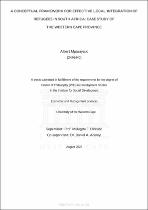| dc.description.abstract | Local integration is one of the three durable solutions to refugee situations, besides voluntary repatriation, and resettlement (into a third country of permanent residency), as advocated by UNHCR, the UN Refugee Agency. Although South Africa’s refugee legislation is sustained by both International Law and the Constitution of the Republic, the country has been struggling to implement its refugee law successfully. Hence, the present study was intended to understand dynamics of local integration, as on the one hand, refugees endeavour to be incorporated into South African core institutions, in attempt to secure a place within South Africa as their host society, and on the other, as local South African citizens make efforts to accommodate refugees in their midst, within their communities, in the country in general, and in the Western Cape Province in particular.The study examines local integration of refugees (within local host communities)1, in urban settings, in South Africa, and by extension on the African continent. In attempt to capture and reflect daily lived experiences and realities on the ground in the real world of refugees in the Republic, the study expanded the four mainstreamed domains (legal, economic, social, and cultural) for local integration of immigrants, into ten domains for local integration of refugees in South Africa. Through snowball sampling, and self-administered questionnaires, the study surveyed a total sample of 1630 participants, of which 1432 were refugee respondents, 110 were common RSA citizen respondents from local host communities, while 4 respondents were representing non-government organisations (NGOs) working with refugees, then 72 respondents were office-bearers from different South African political organisations (of which Government Officials), and 12 respondents were from different South African media houses. | en_US |

